452 Search Results for VISUAL SUPPORTS
April 6, 2014
by Carole Zangari -
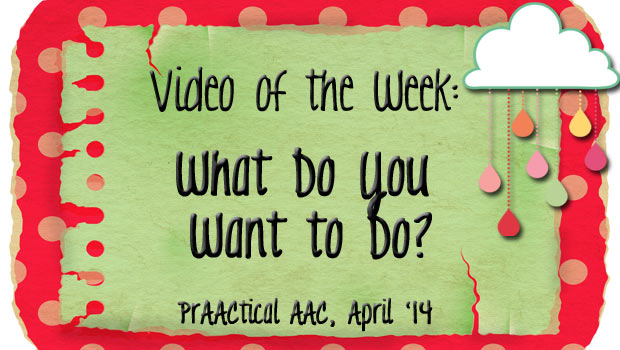
Looking for a prAACtical way to introduce basic visual supports to families of kids with AAC needs? This week we feature a video from Arizona State University’s Tots ‘n Tech Project that is perfect to share with families who are ready to add a few visual supports into their lives. We love the simplicity of this video and the engaging support document that accompanies it. Direct Link to Video: http://tnt.asu.edu/ideas/communication-socializing/what-do-you-want-do-chart
April 1, 2014
by Robin Parker -
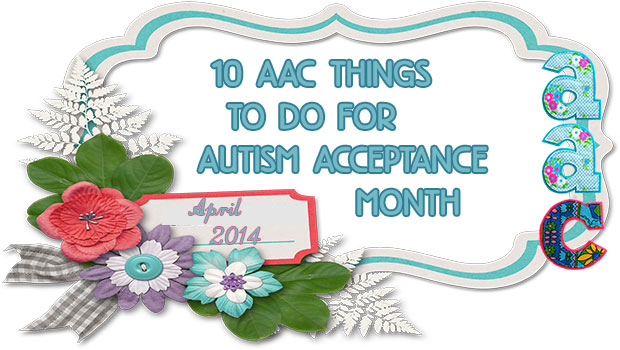
We love Autism Awareness and Acceptance Month. There is so much excitement and great community activities. The month becomes very busy so we love choosing events and projects that facilitate autism acceptance and AAC learning. We pass out materials, have contests, do extra trainings and have many public awareness events. We make sure to support our events and activities with AAC materials. Here are some of the things we do and recommend to support AAC and Autism learning. Please share any activities or projects that you know about. Bake, share, & eat some desserts. Use and include visual recipes when cooking. Need inspiration?.. Go to Your Special Chef for shopping lists and recipes. Educate peers visually by using the Autism Acceptance Book: Being a Friend to Someone with Autism by Ellen Sabin Develop & Use a personal participation story (modified social story) to let alert someone that this will... [Read More...]
March 24, 2014
by Robin Parker -
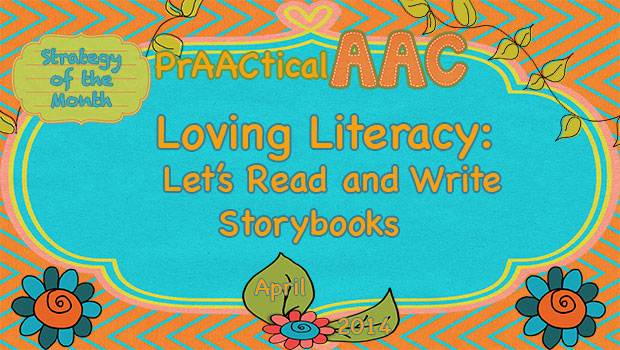
Literacy instruction involves lots of reading and writing. Last week, Carole discussed using storybook reading and the RAAP (Read, Ask, Answer, Prompt) strategy by Drs. Cathy Binger and Jennifer Kent-Walsh to teach communication and literacy. To use storybooks with all learners we need to have lots of books that are easily accessible. Books need to be accessible physically as well as through content and interest. It is lucky that with all of today’s on-line resources there is an abundance of ways to obtain as well as make and write storybooks. All learners can and should be be involved in both the reading and writing process. Not only do literacy skills improve but so do communication skills. Involving Learners in the Storybook Process Reader & Writer Vocabulary- Facilitate involvement by using reader and writer vocabulary. Refer to learners as “readers”, “authors”, “editors”, “publishers”, “critics”, etc. When you are treated and referred... [Read More...]
February 17, 2014
by Carole Zangari -
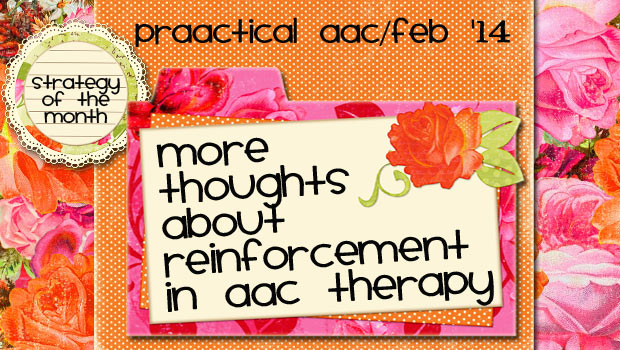
When we’re teaching AAC, our preferred means of responding to learners is with natural consequences, expansions, extensions, and verbal encouragement. Here are some of our prAACtical thoughts. Natural Consequences Nothing says ‘power’ like having someone respond based on what you just said. SLPs are quite familiar with this concept and use this regularly to provide ‘more’ tickles, crackers, and music. When we work with beginning communicators, we’re all about providing quick access to whatever the AAC learner requests. But we tend to lose sight of the need for natural consequences when working with learners on higher level language skills. True, it is more difficult to think of the natural consequence when we’re working on morphology, syntax, and semantics, but the principle is the same: Learning is enhanced when our responses are driven by the message that our client just produced. We’re working with Antonio to reduce ambiguity in his messages.... [Read More...]
January 17, 2014
by Carole Zangari -
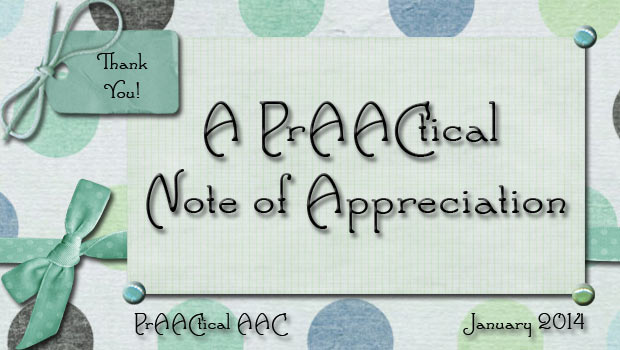
We usually don’t make a fuss over blog birthdays or anniversaries, but this milestone seemed like something worth celebrating. Yesterday, you helped us hit a milestone: Our prAACtical pages have been viewed well over 500,000 times. It’s fun to think of people reading our posts, but this is bigger than us. The ‘AAC message’ is being heard and the AAC community is growing. In every continent, there are SLPs, educators, parents, paraprofessionals, and organization leaders who are giving voice to people who struggle to express themselves. Today, we celebrate YOU! Thanks for the work you do, and for being part of a community that believes everyone has both the right and the ability to communicate. We so enjoy connecting with you and hearing about your prAACtical experiences. Please enjoy these downloadable resources that we’ve developed and shared over the past two years. Forms: Need to flesh out your resources for... [Read More...]
January 10, 2014
by Robin Parker -

STRATEGY OF THE MONTH Supporting Pre-Intentional Communicators Breaking Through with Pre-Intentional & Beginning Communicators of ALL Ages Helping Pre-Intentional Communicators to Cross the Intentionality Bridge More Ideas for Supporting Pre-Intentional Communicators PRAACTICAL THINKING PrAActical Nominations: The 2013 Edublog Awards I was Thinking About Buying an AAC App- Now What? 5 Ways to Encourage AAC Learners 30 P0sts You May Have Missed in November How Much Time Do SLP’s In Healthcare Settings Spend on AAC Services to Children AAC Goes to the Eddies Does AAC Benefit Children with Profound and Multiple Disabilities Throwback Thursday: Talk About Me 2 3 Responses to Programs that Make Kids ‘Prove Worthiness’ Prior ro Providing Access to AAC AAC Vocabulary Lists Throwback Thursday- Past Posts About Pre-Intentional and Beginning Communicators Power Words from PrAACtical Friends A PrAACtical Christmas Carol 8 Ways to Have an AAC Holiday Season A PrAACtical Christmas AACtual Therapy with Shareka Bentham- Started from... [Read More...]
December 24, 2013
by Robin Parker -
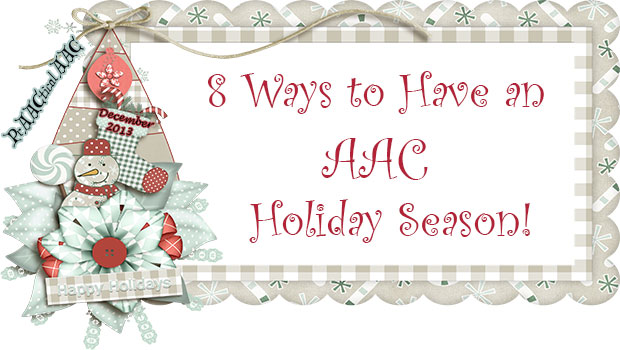
Use social narratives to explain happy upcoming events, stressful upcoming events, and out of the routine type events. Not only do social narratives help with understanding, but they can also help with ways to talk about activities and events. Use Aided Language Input (ALI) to model. It will show that even when there is a lot going on, AAC is still important and a high priority. Give out some AAC related presents to educators, professionals, families, and AAC users. Create the visual supports for holiday songs and poems. Or use a single step or sequential message device to record the songs, so everyone can sing together. You can even program the songs into high tech devices and have quite the good singing voice. Provide frequent communication opportunities for the AAC user to make choices, give opinions, rate activities and events, vent, ask questions, tell, and share information. Make talking photo... [Read More...]
December 19, 2013
by Robin Parker -
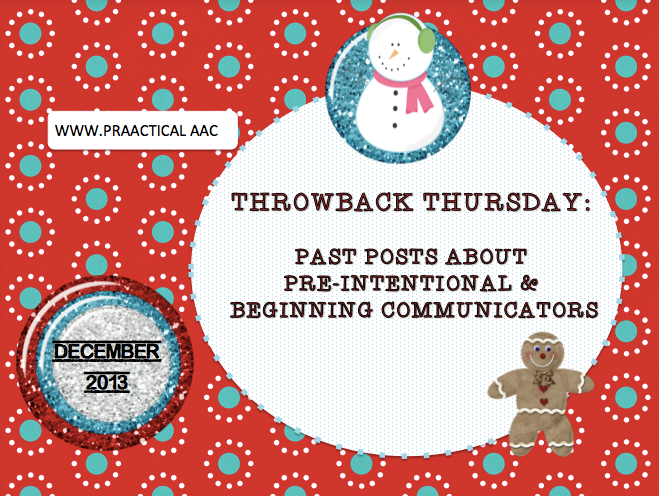
The Strategy of the Month for December is about Pre-Intentional and Beginning Communication. We knew this topic meant a lot to us because these learners are often overlooked or given up on just when they need help the most. We didn’t realize how important it was to us, until we started ’rounding up’ our past posts and found so many. We are fortunate to have worked with many pre-intentional and beginning communicators because they often teach us the most, and we love learning. Presuming Competence 3 Responses to Programs that Make Kids “Prove Worthiness” Prior to Providing Access to AAC Does AAC Benefit Individuals with Profound & Multiple Disabilities Strategy of the Month Strategy of the Month: Supporting Pre-Intentional Communicators Breaking Through with Pre-Intentional & Beginning Communicators of All Ages Supporting Pre-Intentional Communicators Teaching Basic Requests Making it Work: The PrAACtical Side of Therapy to Teach Requests Literacy Lessons for... [Read More...]
December 12, 2013
by Robin Parker -
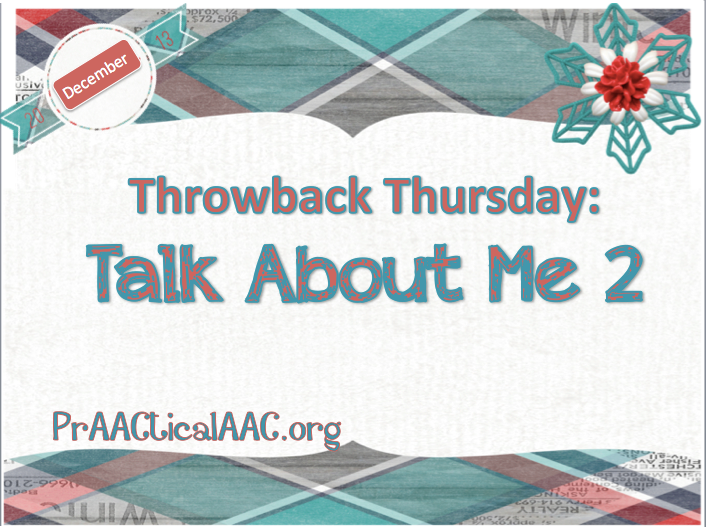
originally published December 13, 2012 We write about a lot of AAC strategies and we often give examples of different types of learners. Sometimes the learners we work with have more challenges than we explain. Lest you think, we do not see the really ‘challenging’ learners, we do, we really do. For those individuals with more challenges than most, sometime we are asked, well what do a few visual supports or AAC strategies do? What difference do they make? The truthful answer is A LOT. Here are a just a few recent examples from some really amazing families. When a mom is on the phone, a young adult brings in a timer and sets it so mom will get off the phone and go sit with her. When a communication book is forgotten on an emergency trip to the dentist, drawing on a napkin is enough to keep everyone calm... [Read More...]
December 10, 2013
by Carole Zangari -
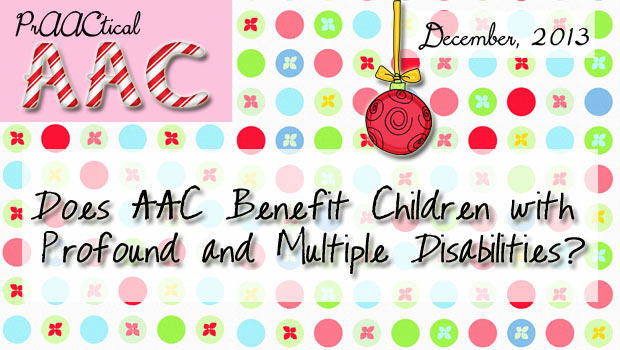
For most SLPs, it is easy to see how AAC can be beneficial to someone with motor difficulties, like cerebral palsy or ALS. To say that AAC strategies and technologies can be life-changing for these individuals is not an understatement. Similarly, the fields of SLP and special education now recognize that visual supports and AAC options are a standard of care for people affected by autism who have little or no functional speech. Not only does AAC provide a means for functional communication, but it also plays facilitative important role in speech and language development. To be sure, there are significant challenges in the implementation of AAC supports and services with these populations, but the practices themselves are now widely recognized for their positive impact on communication, literacy skills, independence, and behavior. But what about individuals with the most significant learning challenges? In this post, we share an article looking... [Read More...]









